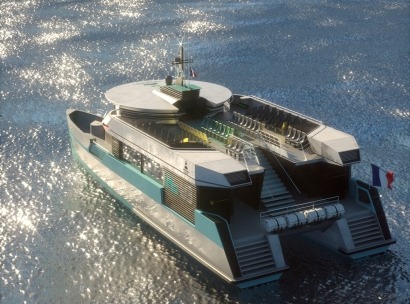
This conference showcases significant developments in the marine sector reflecting the groundswell of interest in the successful deployment of electro-hydrogen power to meet strict emissions regulations, public awareness, and demand for cleaner transportation options.
Green Navy is a pioneer in the decarbonization of maritime transport, setting the standards for future regulation of hydrogen installation technologies. The company is collaborating with governments, research institutions and industry partners to showcase the advantages of hydrogen storage and fuel cell development across a range of marine applications from regular island hopping, to growing eco-tourism.
“This clean, green, power source generates electricity via a fuel cell which combines hydrogen with oxygen from the air to create electricity and water. The electricity charges the batteries to power the vessel’s electric engine which turns the propellers to move it forwards,” explains Charles Cardi, CEO of Green Navy.
“Electro-hydrogen propulsion is cleaner than diesel or other fossil fuels because it does not produce harmful emissions like CO2 or sulfur which contribute to air pollution and climate change. It is quieter and more efficient, making it better for the environment and closer to the global goal of cleaner and more sustainable transportation on water.”
Unique in the marketplace, Green Navy is the first company in Europe to implement this technology on board a passenger catamaran, however, the Green Navy solution goes much further. The vessel will also be supplied with green hydrogen to ensure a complete carbon-free chain. In addition, Green Navy has developed an innovative transmission system, with an optimized gearbox that develops greater torque at reduced speed, thus improving efficiency and making it easier for the crew to operate.
“Our team of engineers has re-engineered the propulsion system and the vessel architecture to reduce mass and optimize energy efficiency” adds Cardi. “Green Navy offers adaptable, efficient and environmentally friendly solutions for operators to buy or lease. ‘Prometeo’ is carbon-free, silent, vibration-free, odor-free, and easily maneuverable – which makes it a pleasure for crews and passengers alike.”
Production of ‘Prometeo’ is already underway at Merré shipyard in Nort-sur-Erdre and transportation of the passenger catamaran’s twin hulls to the Merré shipyard in Brest is scheduled for Spring 2024. The launch ceremony for this globally important vessel will take place in Spring 2025.
“Our commitment to efficiency has seen us work closely with G-Sea Design on the ultimate precision of structural calculations. This has resulted in a lightweight catamaran with exceptional strength and rigidity – tested in all weather conditions and in passenger/cargo/ and combined configurations. We have a clean technology vessel that is carbon-free with low energy consumption, offers full marine capacity, is made in France and available at short notice.
"But what really differentiates Green Navy is our flexibility. Our electro-hydrogen solution is uniquely adaptable to every operator’s budget. Any size of craft can be built with a carefully calculated and optimized weight/performance ratio that dictates the number of batteries and hydrogen bottles required.”
Many governments are offering incentives, grants, and subsidies to promote the adoption of clean energy technologies in the maritime industry and this year, 175 IMO (International Maritime Organization) member countries signed a ‘FuelEU Maritime’ agreement to reduce greenhouse gas emissions from maritime freight.
“As a business Green Navy is focusing on its mission to decarbonize maritime transport and freight, secure investment for growth, and we are working closely with the French Government and maritime clusters in France to establish a center of excellence for this important new direction in energy transition," concludes Cardi.

